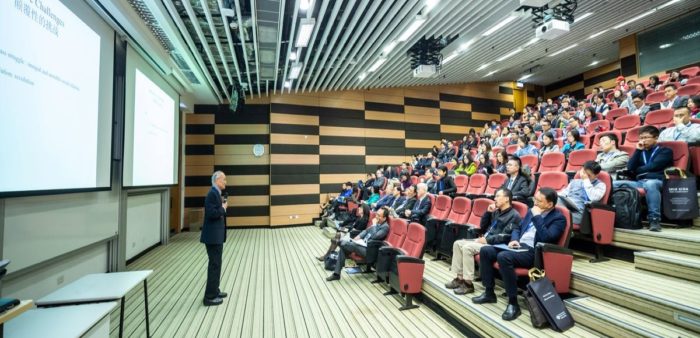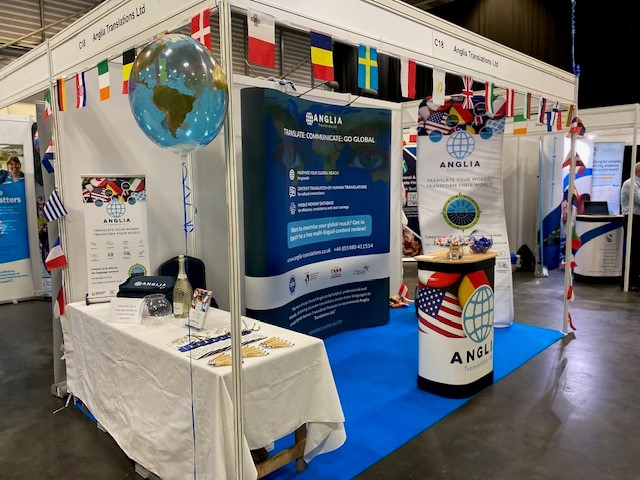A Guide to Simultaneous Conference Interpreting
When interpreting simultaneously at a conference, an interpreter will translate the presenter’s words into a different language in real-time. This way, the natural flow of what the speaker is saying is maintained, and the audience benefits from a smooth output.
Preparing for a conference that requires simultaneous interpretation involves finding the right interpreter and sourcing the correct equipment, which can often be a time-consuming process.
In this guide, we’ve put together what you need to think about when preparing a simultaneous interpreting solution.
When Is Simultaneous Interpretation Appropriate?
Due to the fact that there are no long pauses for the interpreter to take a moment and think through the speech during simultaneous interpretation, this kind of interpretation is most appropriate for large-scale events, such as speeches and conferences. This is because a delay in the delivery of the speech has the potential to impair the influence of the words that are being spoken.
Simultaneous interpretation has two main advantages:
- Saves Time
- Retains the natural flow of the words that are spoken to the audience
Simultaneous interpretation is very demanding on the interpreter as it requires high levels of concentration to be able to instantly translate what is being said whilst listening to the next part of the speech.
Often, the exact details of the content of the speech won’t be known to them until everyone else hears it. Therefore, for events lasting more than one hour, two interpreters per language are needed, as they require regular breaks.
Interpretation Equipment

Conference organisers have traditionally chosen to rely on hardware-based interpreting equipment, which enables the audience to listen in to the interpreters throughout the conference.
This equipment works when:
- The speaker talks into a microphone.
- What they’re saying is broadcast to an interpreter, who will usually sit in a soundproof booth, listening to what is being said through headphones.
- As the interpreter listens, they will translate in real-time by speaking through a microphone.
- The interpretation will then wirelessly transmit to the headphones of the people who require interpretation.
Renting or Purchasing Simultaneous Interpretation Equipment
When renting or buying equipment, there are a few things you need to bear in mind to ensure you’re getting your hands on the correct kit to be sure of successful interpretation.
You must consider:
How Big the Audience Will Be?
Once everything is planned and ready to go, the last thing you need is to discover that you’re short of receivers.
You’ll need to ensure that you get the most accurate headcount that you possibly can, to determine how many headsets will be required. A few spares will be needed as well, in case of larger audience size or problems with any of the receivers.
How Many Languages Are Required?
Once you’ve figured out your approximate audience size, you’ll then need to find out how many languages the conference will need to be translated into. This is because the number of languages that need to be translated will have a direct impact on how many transmitters you’ll require and how many interpreters you’ll need.
Is a Portable System Required?
Most venues, generally speaking, will not have permanent installations for interpreting. Instead, portable equipment will need to be brought in.
The degree of portability will vary depending on factors such as power and ease-of-setup. At Anglia Translations Ltd, we have experience in supplying all the equipment required, including the interpreter booth, as well as the interpreters.
Where Will the Interpreters Be Seated?
It’s incredibly important to find the best location for your interpreters. Their work takes a lot of effort and vast amounts of concentration. It is crucial to set them up in their own soundproof booths, where they can get comfortable with a good view of the speaker.
Interpreter Booths
Interpreter booths are an absolute essential for the simultaneous interpretation process.
The interpreters need to be physically present, and these kinds of events can become quite noisy, which is why, considering the kind of pressure interpreters are under, it’s crucial they are given a soundproof environment to work in.
Interpreter booths can be either permanent or mobile. However, both are strictly regulated by the International Organisation for Standardisation’s standards regarding conference interpreting.
Full-size interpreter booths have walls, floors, a ceiling, doors, and even ventilation systems. Usually, they can house at least two people – larger options fitting up to four.
Interpreter Booth Necessities
First things first, you must ensure that the interpreters are able to see the stage, the speaker and their presentations clearly. Getting a clear view makes interpreting a much easier task for the interpreters.
In addition to this, reliable internet access and power outlets are essential for laptops and tablets.
You will also need to ensure that acoustic conditions remain at optimal levels, to ensure that the booth is as quiet as it possibly can be.
If you work with us, we will ensure that you have all the right equipment for the size of the venue, and the number of delegates as well as the appropriate interpreters.
Other Crucial Equipment
Interpreter Console
This device delivers the words of the speaker to the interpreter, which is then transported as interpreted speech to those in the audience wearing receivers. This piece of kit must be situated within the interpreter booth to ensure the interpreters can control the volume of the headphones.
Receivers
Receivers are portable devices that allow the audience to hear the result of the interpretation on their earpieces. As we’ve already mentioned, it’s pretty key that you have the right amount and any spares to ensure everyone who needs one gets one.
Transmitters & Sound Equipment
Sound equipment encompasses things such as speakers, microphones, and all the necessary cables and wires. Transmitter equipment includes the devices which transport the words of the speaker from the microphone to the interpreter console, and then the interpreters voice to the receivers in the audience.
Hiring the Right Interpreters
Once your structure is in place, it’s time to consider the right people for the interpreter role. In this section, we’ve put together our suggestions for hiring the right simultaneous interpreters.
Think Carefully About What You’re Looking For
It sounds obvious, but it’s far better to be completely clear on what you’re looking for right from the off. For example, it’s important to remember that there is actually a difference between a translator and an interpreter since they’re sometimes thought to mean the same.
A translator will deal with the written word, and an interpreter works with spoken languages. Although we provide both of those services here at Anglia Translations, they require very different skillsets.
It is recommended that you provide as much background material to the interpreters prior to the event as you can.
If you have copies of the presentations that you can provide prior to the event, an interpreter can familiarise themselves with the material which will ensure a far smoother and more professional service. Understanding the subject matter will ensure the interpreter uses the right terminology.
Are You Looking for a Specialist?
Simultaneous interpreting is a complex skill. An interpreter will need to listen, understand and memorise what the speaker is saying presently while speaking the words that were spoken ten seconds ago, and all in another language.
This requires a strong knowledge of the technical vocabulary of the subject that is being spoken about since there is no time to stop and look up what a word or phrase means.
So, if your conference is about finance, then you might look to hire a specialist in that field, rather than a general interpreter. It is therefore important to provide as much detail about the event, the programme, the content and the speakers as you can when you are sourcing your interpreters.
Local & International Associations
One of the safest ways to find a trustworthy and experienced interpreter is to speak to a professional company who can provide both the interpreters (perhaps in multiple languages) as well as the technical equipment.
At Anglia Translations Ltd, we have provided simultaneous interpreters for large multinational conferences, as well as consecutive interpreting for small business meetings.
Word of Mouth Recommendations
There is nothing better or more trustworthy than a word of mouth recommendation. This is particularly relevant when looking for interpreters. Ensure that you chose an accredited interpreter (a member of a professional body such as the Institute of Translation and Interpreting) or an accredited and experienced translation company to help you source the right solution for your needs.
If you have any questions about anything we’ve covered in this piece, or you’d like to find out more about any of our services, then why not contact us today?



